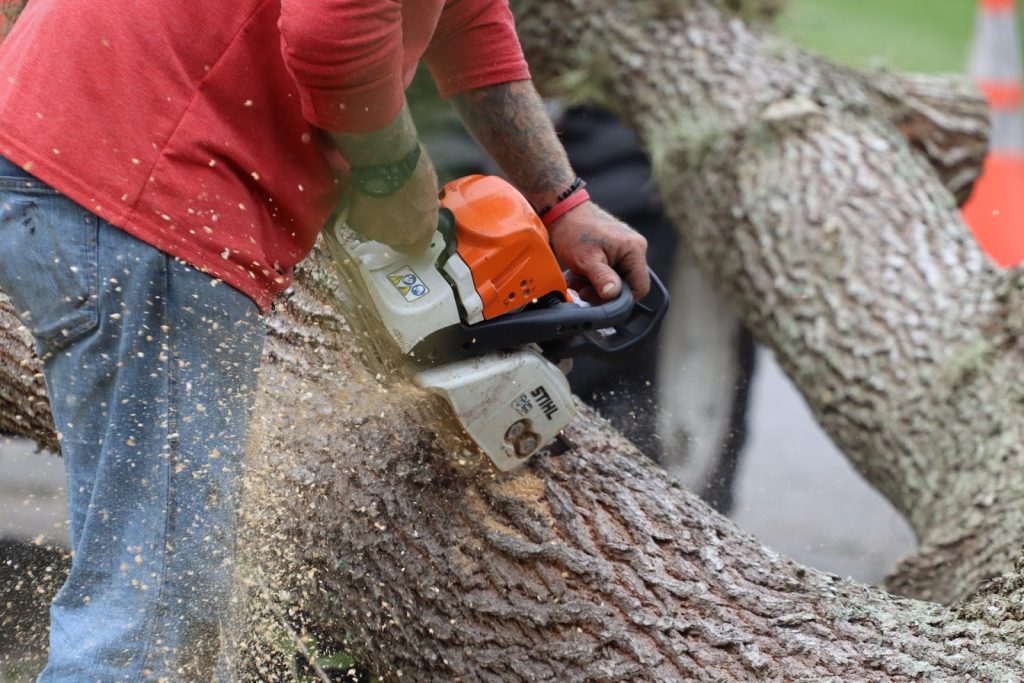No one wants to deal with pesky carpenter ants in their home, but the good news is you can easily prevent them from taking up residence in your house.
If you’re looking for the best ways to identify carpenter ants and prevent them from causing damage, here’s what you need to know.
Easy Ways To Keep Carpenter Ants Away
Prevention is key when it comes to foraging carpenter ants, as they can do considerable damage to your home if left unchecked.
Fortunately, there are some easy steps you can take to help keep them at bay.

The first step in preventing carpenter ants from entering your home is identifying any entry points they might be using. Take a careful look around your home, paying extra attention to any potential entry points, such as cracks in the foundation or areas where pipes and wires enter the house.
Seal these areas with caulk or other appropriate sealant material to prevent carpenter ants from entering.
They could also enter your home through tree branches close to your windows.
Remove Sources of Moisture
Carpenter ants are drawn to moist or humid areas, so reducing the moisture in your home is key to preventing an infestation.
Repair any leaking pipes or faucets immediately, and consider investing in a dehumidifier for your basement or damp areas of your home. Also, remove any sources of standing water outside the home, such as water dishes for pets or potted plants, as these can attract ants.
Clean Up After Meals
Regularly cleaning up any food crumbs or spills prevents carpenter ant infestations. Keep counters and floors clean, and sweep away any food debris left behind after meals. Vacuum carpets and upholstery regularly to ensure that any food crumbs are removed quickly and efficiently.
Store Food Properly
Properly storing food is essential to stop carpenter ants from entering your home. Store all food items, including pet food and bird seed, in sealed containers so that ants cannot access them.
Ensure that all food containers, such as cans and jars, are firmly sealed and kept away from areas of the home prone to moisture and humidity.
Trim Trees and Shrubs

Carpenter ants are attracted to moist, dark places, so clear away any debris around your home.
They like to eat wood, so keep wood piles away from the house, trim trees and shrubs, and clear gutters of debris. Remove any dead branches that may serve as nesting grounds for the ants. These areas can provide a great home for carpenter ants, so keep them as clean and dry as possible.
Reduce Wood-To-Ground Contact
Carpenter ants are attracted to wood, so it’s important to reduce the amount of wood-to-ground contact around your home. If possible, replace any wood that is touching the ground with a material like concrete, brick, or stone.
If this isn’t possible, keep damp wood away from the house and regularly inspect it for signs of carpenter ant activity.
Try Natural Remedies
If you’re looking for a more natural way to prevent carpenter ants, consider using some of these remedies.
These include using a mixture of water and dish soap to create an ant barrier around doorways, windows, and other potential ant entry points. You can also use cedar shavings or ground cinnamon to create a natural barrier, as carpenter ants do not like the smell of either.
Sprinkling cinnamon or ground pepper near areas where carpenter ants tend to enter can help deter them. Other natural remedies include using vinegar, borax, and cucumber.
You can consider making a spray of garlic, chili powder, and water. Spray it in areas where the ants are living or entering. The scent of these ingredients will be too much for them, and they will stay away. If necessary, reapply the spray every few days.
Inspect Regularly for Carpenter Ant Infestation
Regular home inspections are the best way to catch and prevent a carpenter ant infestation. Pay particular attention to any damp or dark areas where carpenter ants hide.
Hire a Professional

If your attempts to prevent carpenter ants fail, hire a professional. They can also help you identify and seal entry points and locate and remove nests so carpenter ants won’t be able to enter your home in the future.
Moreover, a professional pest exterminator can help you detect and eliminate any existing carpenter ant infestations and advise how to ward them off in the future. They will also be able to locate the carpenter ant nest.
Finding where the source is and locating carpenter ant colonies will greatly help by eliminating the problem from the source.
With a little knowledge and effort, you can protect your home from carpenter ants and enjoy a pest-free living space.
What To Do If You Suspect Carpenter Ants
If you notice signs of carpenter ant activity in or around your home, it’s crucial to act quickly. You should identify the problem accurately to take the necessary steps to prevent an infestation.
Inspect Your Home for Signs of Infestation
If you suspect carpenter ants, carefully inspect your home for any visible signs of an infestation. Common indicators include sawdust near windowsills or door frames, rustling noises in the walls, and ant trails near windows and doors.
If you cannot identify the source of the problem, call a professional.
Try DIY Solutions
If you find signs of carpenter ant activity around your home, there are a few DIY solutions to try.
Some of these solutions include using store-bought ant traps, spraying insecticide around crevices and entry points to the home, and applying a boric acid solution to ant trails.
Try Natural Remedies
If you prefer to avoid using chemicals, there are a few natural remedies, such as sprinkling diatomaceous earth around the perimeter of your home or using a mixture of vinegar and water sprayed around entry points.
Essential oils such as tea tree oil and clove oil are known for their ant-repelling properties.
Final Thoughts
Carpenter ants are a nuisance and can cause major damage to your home. But with the right preventive measures, you can safeguard your home from an infestation.
Regular inspections, DIY solutions, natural remedies, and professional pest control services are great methods of taking care of your home and avoiding carpenter ants.
By taking the time to inspect your home and implement preventative measures, you can avoid costly repairs in the future and keep your living space ant-free.
Recommended Reading:
